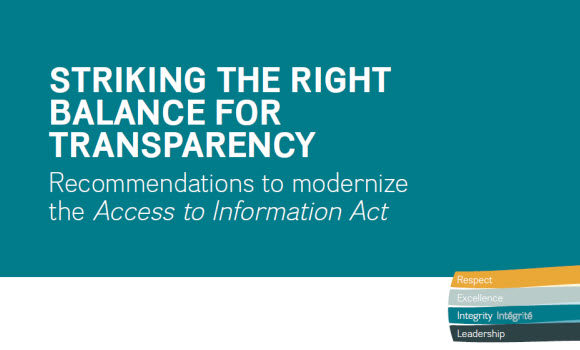Information Commissioner calls for changes to access to information law
Federal Information Commissioner Suzanne Legault has tabled a report in Parliament recommending changes to Canada’s Access to Information laws.
Federal Information Commissioner Suzanne Legault has tabled a report in Parliament recommending changes to Canada’s Access to Information laws. The recommendations include extending the Act to cover the Prime Minister’s Office and other government-related institutions, replacing exclusions from the Act with more narrowly defined exemptions and giving the commissioner power to order the release of information.
Legault’s recommendations would also give government offices the right to refuse “frivolous and vexatious” requests, and would mandate a review of the access to information legislation every five years.
A group of civil society organizations hailed the report, entitled Striking the Right Balance for Transparency: Recommendations to modernize the Access to Information Act, as a useful roadmap for fixing a system “in crisis.”
In a statement, the commissioner’s office said that the recommendations are “aimed at creating a culture of openness by extending coverage of the Act to all branches of government, setting tighter timelines in the processing requests, maximizing disclosure by ensuring that exemptions protect only what is strictly necessary, and strengthening the oversight of the access to information regime.”
Legault recommends extending the legislation to cover institutions it does not cover now, specifically including the Prime Minister’s Office, the offices of cabinet ministers, institutions that support Parliament and those that provide administrative support to the courts. She also recommends establishing criteria to determine what other institutions should be covered.
[node:related]Recommendations on the right-of-access include extending that right to non-residents and requiring government offices to document and report the unauthorized loss or destruction of records.
Legault would also allow institutions to refuse to respond to “frivolous and vexatious” requests—but would allow such refusals to be appealed to the information commissioner.
Timely access to information is “a pillar of any access to information regime,” the report says, but a frequent cause of complaints from people requesting information. The Act sets a limit of 30 days to respond to information requests, but allows extensions for a reasonable period. The proportion of requests where extensions are taken has remained relatively stable at 25 to 30 per cent since 2002-2003, the report says, but the length of the extensions has grown, with 79 per cent of extensions for more than 30 days in 2013-14.
The report recommends limiting extensions to “what is strictly necessary, based on a rigorous, logical and supportable calculation,” and to a maximum of 60 days. Any extensions longer than 60 days would require the commissioner’s permission.
The recommendations also include removing all the existing exclusions in the act and replacing them with exemptions. This would include the controversial exclusion of “cabinet confidences,” which the commissioner says has been interpreted too broadly. An exemption would remain for information that would “reveal the substance of deliberations of Cabinet.” Legault also proposes a public interest override applicable to all exemptions.
To strengthen oversight of the Act, the report calls for the present ombudsperson model, where the information commissioner may investigate access to information complaints and make recommendations but has little power to enforce her recommendations, with an order-making model. The commissioner would also have the right to adjudicate appeals at her discretion.
Recommendations also include a broader range of sanctions for non-compliance with the Act, including administrative monetary penalties and disciplinary measures and criminal sanctions.
The report also recommends amending the Act to reflect the government’s open government initiatives and commitment to a culture of openness by default, including additional requirements for proactive disclosure, the obligation to publish information of public interest and the requirement to adopt publication schemes.
Finally, it recommends that Parliament review the legislation every five years.
A group of civil society organizations concerned with access to information applauded the report. The British Columbia Civil Liberties Association, BC Freedom of Information and Privacy Association, Canadian Association of Journalists, Canadian Civil Liberties Association, Canadian Journalism Foundation, Canadian Journalists for Free Expression, Centre for Law and Democracy, Democracy Watch, OpenMedia, PEN Canada and the Right to Know Coalition of Nova Scotia said Canada’s access to information system is in crisis.
“The Report is a robust assessment of the current system and provides a useful roadmap for starting a broad public consultation on how to update the Act to better serve Canadians and streamline processes for public authorities,” the 11 organizations said in a joint statement.
Grant Buckler is a retired freelance journalist and a volunteer with Canadian Journalists for Free Expression and lives in Kingston, Ont.

